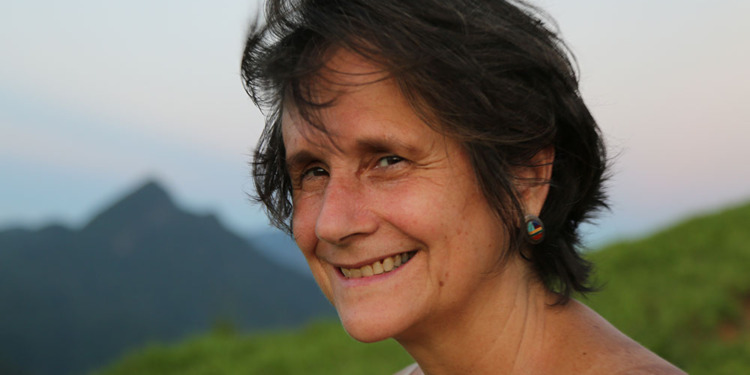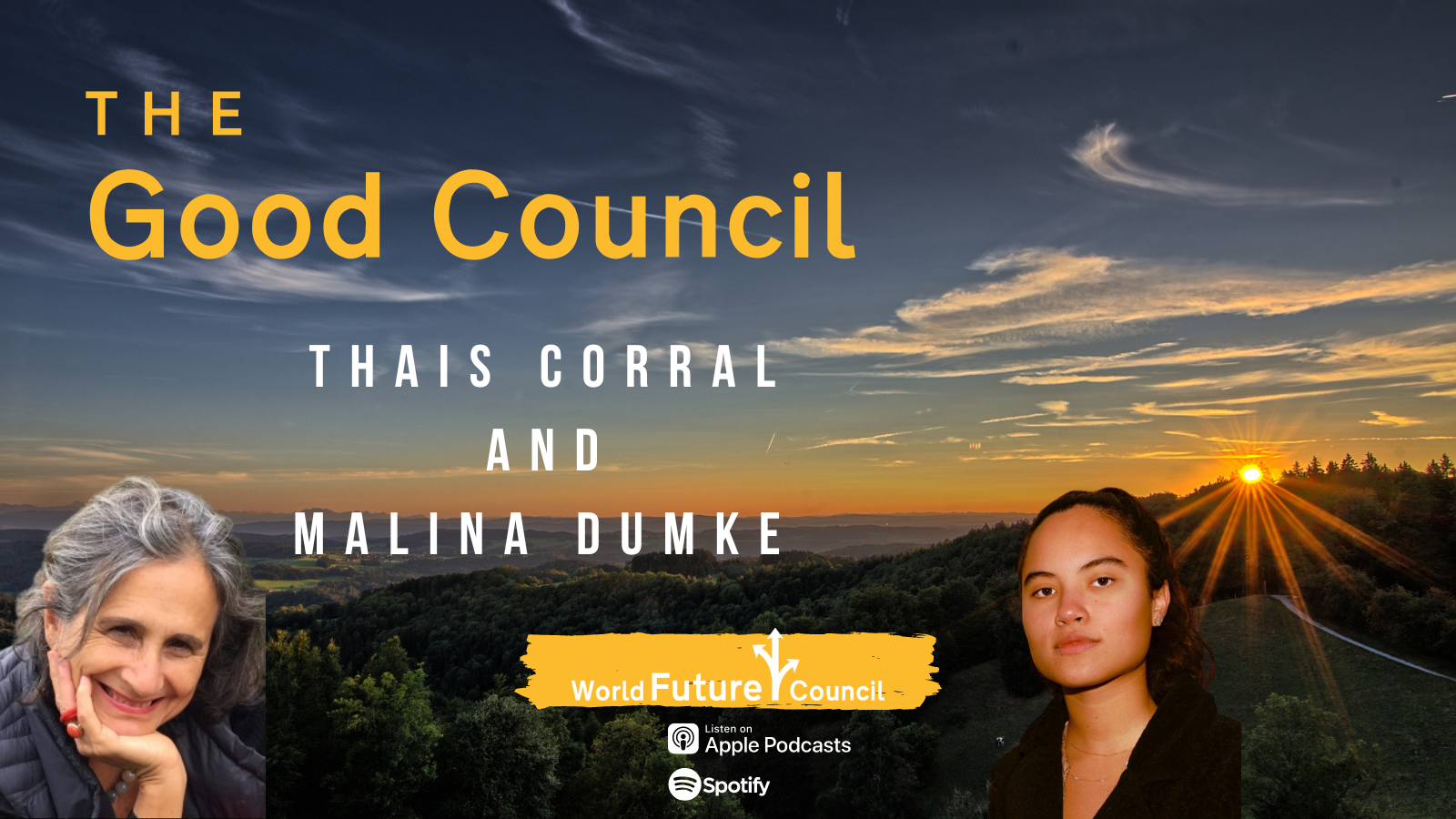This is the eighth article in the series “The Good Council,” based on the World Future Council’s podcast with the same name. The series gives a behind-the-scenes look at the organization’s trajectory, from revolutionary ideas to reality, and offers insights into its current agenda. The Good Council podcast provides inspiration, laughter, and food for thought through intergenerational dialogue between its founders, senior Councillors, and young entrepreneurs and activists from around the globe.
The World Future Council aims to give our children and grandchildren a healthy planet with just and peaceful societies. To achieve this, the foundation identifies, develops, highlights, and spreads awareness of future solutions for current challenges humanity is facing, awarding them with the unique Future Policy Award.
What are best practices and sustainable solutions for our common future? How can we leave the planet in better shape for future generations? These are the questions the World Future Council has set out to answer.
The Council consists of fifty eminent global changemakers from civil society, science, politics and business. They meet annually at the World Future Forum to discuss the most urgent challenges and policy solutions.
In the first episode of season two of The Good Council podcast, World Future Council’s 18-year-old volunteer Malina Dumke had a conversation with Thais Corral, a social innovator and entrepreneur, a woman’s rights and ecological activist, and Councillor of the World Future Council.
Thais Corral is the founder of Sinal Do Vale, a Brazilian regeneration campus for action learning located near Rio de Janeiro, which serves as a center for the regeneration and remediation of ecosystems, communities and individuals. She is one of the leaders who actively participated in organizing the Earth Summit in 1992. Together with the Nobel Prize winner Wangari Maathai, World Future Councils’ honorary councillor, she co-founded the Women Environment and Development Organization “WEDO.”
Thais also founded two well-respected non-governmental organizations in Brazil: the network of human development “REDEH” and communication education and information on gender “CEMINA,” which supported the creation of a network of 400 Women’s radio programs all over Brazil. For her accomplishments, she was awarded the Women of the Year 2001 title by the Brazilian National Council of Women. As part of WEDO, she won the UNEP Global Champions in 2006, and the Silicon Valley’s tech interactive award for social technologies that benefit the economy.
In this article, Malina will talk to Thais Corral about her path to becoming an environmental activist, her role as a Councillor for the World Future Council, and her experience in environmental protection.
Malina Dumke: You lived in Italy for five years. And after that, you decided to become a journalist. How did this influence your decision later to become an environmental activist?
Thais Corral: I grew up in Brazil during the military dictatorship, which was very dry as it was very limited as a cultural environment. And, as a young woman, I was longing for new experiences, new horizons, for new environments. And that was what brought me to Italy, where I met the feminist and the environmental movement. All this influenced the course that my life took afterward. During this time in the 80s, I found meaning in my life. When I came back to Brazil in the late 80s, the dictatorship had come to an end and there were all kinds of movements. The years before somehow prepared me for this return to Brazil, in which I could have a contribution aligned.
Malina: Since 2011, you are a Councillor of the World Future Council. What makes the WFC so special for you?
Thais: The intention of it. The vision of Jacob and Alexandra and of so many of the Councillors that have been there since the beginning. The mission was to identify good examples that can illustrate how it could be – through policies, and through livelihoods. I was so inspired to see how many good people are in the world and how they are supporting each other. I think especially organizations like the World Future Council unite many good people that can help to spread exemplary policy solutions. These policies should really have a central role in the movement we are leading, especially for new generations.
Malina: Talking about movements, you organized the legendary Earth Summit in Rio de Janeiro in 1992. And worked closely together with our Honorary Councillor Wangari Mathai. When it comes to environmental protection and climate protection, how has the dynamic changed since then?
Thais: We were very hopeful at the time. The governments met with different sectors of civil society, industries, unions, municipalities, NGOs, the women’s movement, and the indigenous movement. They all came together to discuss an agenda for the 21st century. We really were very hopeful that this would be the beginning of a big change. But it didn’t go like this. Nowadays, we look at the same problems, only in a more realistic way. The pandemic showed us that we will have to face the consequences of what we avoided taking care of in the past.
Malina: Do you think that the role of politics and powerful people in promoting environmental protection has changed over the past 30 years?
Thais: I don’t think so. Today there is so much influence from social media, reaching large groups of people. On the one hand, we have more and more groups that are concerned and determined to embrace change. But on the other hand, the majority is still falling into old patterns. For me, it’s important that we, as activists, as agents of change, as people who are aware, keep doing whatever we can.
Malina: Totally. Topics like food security, reforestation, and soils are very close to your heart. You’re also the co-chair of the World Future Council commission on ecosystems and livelihoods. Why are these topics so important to you?
Thais: I came to understand how important it is for us to really connect and understand the importance of ecosystems, the soil, the water, the animals that sustain these systems. It is connected to life, and we lost awareness of that. Nature is bringing us back to what we are. That’s why it is so close to me. It provides a connection to a web of life!
Malina: You are the founder of “Sinal do Vale,” which is described as a “place to regenerate ecosystems, communities, and individuals through learning experiences and inspiring relationships.” What does “Sinal do Vale” mean for you?
Thais: Sinal do Vale was something I started when I was 50 years old. And after many years of being a global activist, I wanted to create a place to nurture, to use my knowledge and my resources, to build a place for caring. To care for the soil, food, and ourselves; to help us connect to certain rhythms that we lost and get used to meeting them again. For me, SINAL is a learning process, a new way of learning together, learning with nature and practicing this new way of being and doing. I hope that Sinal is an example for the present and the future.
Malina: What role does Education for Sustainable Development play in Sinal?
Thais: At the center of our Mandala (our symbol), it says “regeneration through learning.” It’s all about learning – about educating ourselves. It’s a process of educating together. Everybody has something to teach, and we learn together in a community because it’s a long-term process. Knowledge is part of our history on this planet and there are many ways of learning and acquiring knowledge.
Malina: More than 1,000 young people – students, volunteers, and local residents – came together to help Sinal develop the project and plant those seeds. What role do young people play in the regeneration and remediation of our habitat?
Thais: I think anything that has meaning has to resonate with young people because they have to feel that it is relevant to them. As I get older, I see how important intergenerationally is because those young people need to look at the ones that already crossed the desert. I don’t know if the desert it’s a good image, but life is challenging! To create meaningful life requires a strong intention beyond the formula already made by society. It’s very important to be around people who have already done this and have made these choices before you. They can share the knowledge of their own path.
Malina: Thank you so much for your advice. Are you hopeful when you look into the future?
Thais: I think the world is a mess, but I am hopeful because I think that there are many people with the right awareness. We are here to improve our talents, to improve our skills, to improve ourselves as humans. I think we have to keep doing that. And in that sense, I am optimistic: Every day I wake up in the morning, and I am open to a new day and its mysterious possibilities that open all the time.
— —
Every other week the World Future Council will see the Councillors get together with young activists and changemakers from around the globe, who are also part of WFC’s youth forum Youth: Present. New episodes are released every other Monday and can be found here: www.worldfuturecouncil.org/the-good-council.
Editor’s Note: The opinions expressed here by the authors are their own, not those of Impakter.com –In the Featured Photo: Thais Corral. Featured Photo Credit: Thais Corral/World Future Council.











